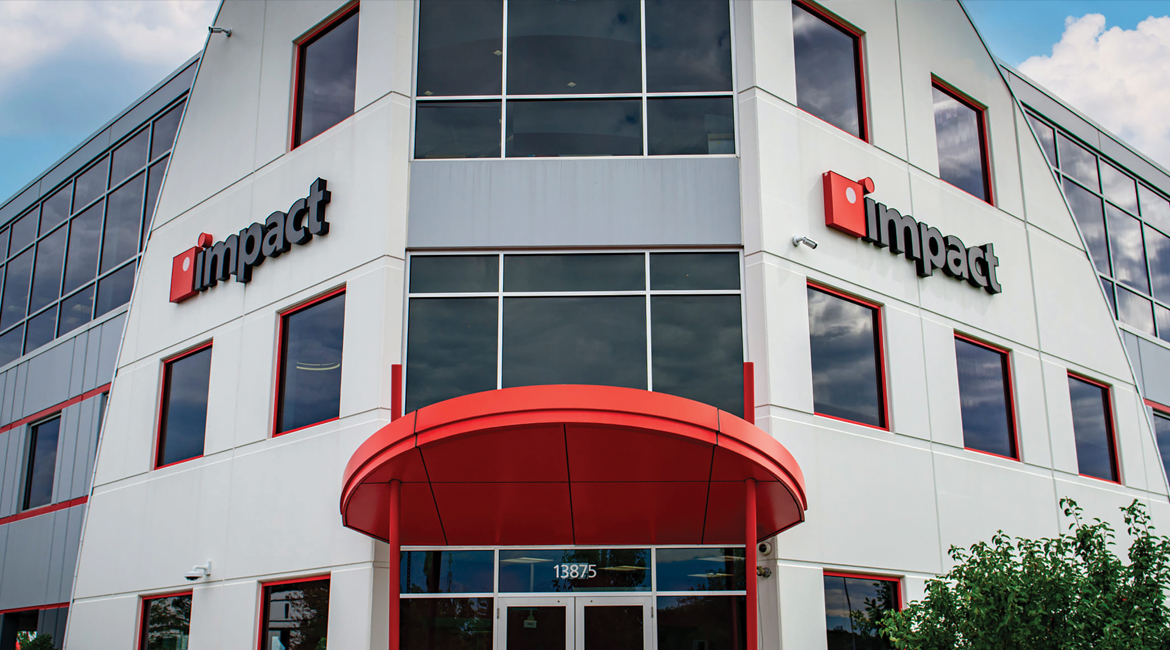Frank Cucco’s presentation at the Executive Connection Summit detailed what makes Impact Networking stand out.

There’s something about Impact Networking, and that was abundantly clear during the first presentation on the first day of the Executive Connection Summit in Scottsdale, Arizona, on January 15. CEO Frank Cucco kicked things off with the story of his journey into the industry and how he built what has become a $200-plus million dealership. He was followed by a team of Impact Networking executives who shared how the company built a successful IT services operation, as well as insights into its hiring strategies.
Impact Networking’s ECS Inspiration
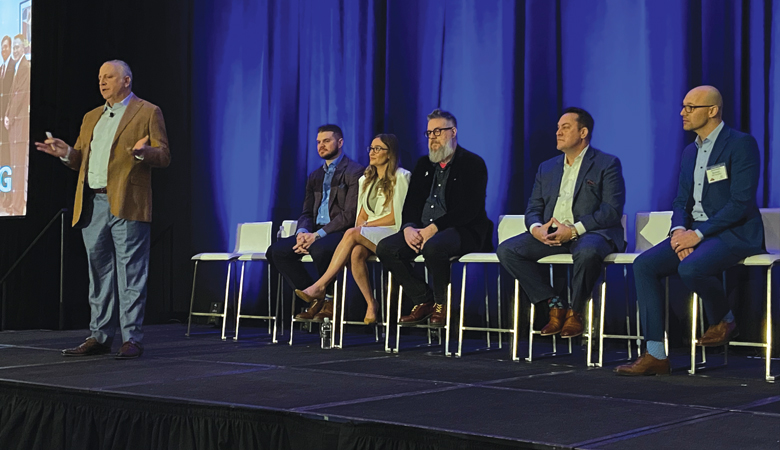
Frank Cucco and his team presented the opening keynote at the Executive Connection Summit. Left to right, Cucco, Mike Lepper, Ashley Carnes, Jon Evans, Patrick Layton, and Jeremiah School.
Cucco’s reason for attending the Executive Connection Summit was to find one or two things he could bring back to his company and execute. “The key word is execute,” he said. “You have to be able to implement these things.”
What resonated with Cucco at ECS 2023 last year was an industry initiative to hire more veterans. Cucco thought it was a great idea, and Impact Networking executed that by hiring 150 veterans in 2023. Those veterans now represent 5% of the dealership’s employees. “The great thing about veterans is they’re disciplined, they’re organized, they’re strategic,” said Cucco. “They have technical training. It’s awesome. It’s been a really great idea that we were able to execute.”
Going back to an earlier Executive Connection Summit, Cucco was inspired by Rick Taylor, then leading Konica Minolta, to add IT services to Impact Networking’s offerings. Today, the dealership has one of the most successful IT operations in the office technology industry, one which is a model for mid-to-large-sized dealers looking to build a business in that segment, as well as managed cybersecurity and managed digital transformation.
“That really changed the face of Impact,” observed Cucco about the move into IT services. Patrick Layton, Jeremiah School, Mike Lepper, and Jon Evans offered further details on how Impact built those departments and their strategies for success following Cucco’s presentation.
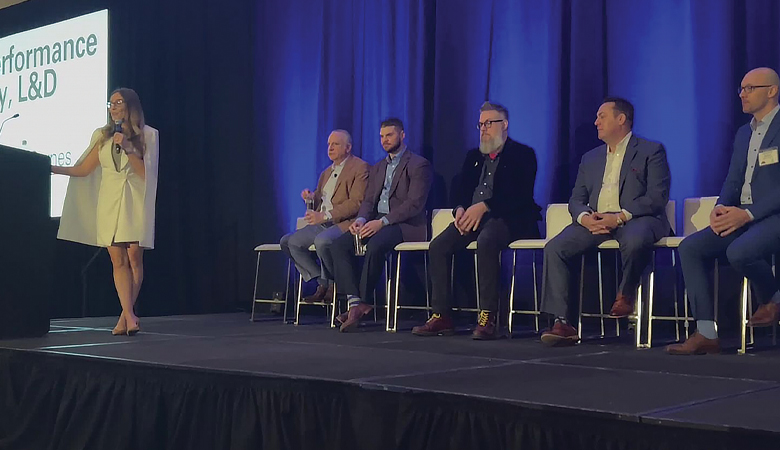
Ashley Carnes discusses the company’s learning and development strategies and how that helps with employee retention.
Meet Frank Cucco
One might say that after nearly 40 years in the office technology industry, Frank Cucco needs no introduction. However, until his ECS presentation, not everyone knew all the nitty gritty details. Cucco’s career began at Savin in 1985, a job he deadpanned was the best in the world.
“I got to go down to the basement and sort mail by ZIP code,” he recalled. “They taught me how to put two rubber bands around that, put it in a bag, and take it to the post office. I did such a great job that they promoted me to contracts and supply sales. Down the road, that ended up helping me because when I opened Impact, my own company, I had an idea of how other things worked in the company.”
From Savin, he went into telemarketing, which he emphasizes is important even today. “They handed me the green bar sheets…and they’re like, ‘Go make calls,’” said Cucco. “I was like, ‘Make calls? I don’t even know what I’m doing.’ So, after I got harassed and hazed for about a week or so, making calls and getting hung up on every day, a couple of the guys took me under their wing and taught me how to do things right. That was a turning point for me. And really, that’s what [ECS] is about, helping each other.”
His stint in telemarketing led to a job at Creative Business Solutions in 1988. The company was based in Wisconsin and was looking to expand into Illinois. Cucco led the supplies team and the contracts team for both states. In 1992, he joined a startup, Image Tech, as director of sales, overseeing three teams of eight people.
“The greatest thing I learned from that experience was what not to do,” recalled Cucco. “It was my greatest lesson in life. People will tell you what to do, but you can see how things are destructive in companies and how people aren’t treated properly, and that’s why there’s massive turnover.”
This new company was a joint venture with Kyocera, who invested half the money. Cucco and two partners put in the other half. It was a rocky start. Cucco was sued by his previous company and used most of the seed money to settle with the other company and pay the lawyers, leaving about $200,000 to run Impact. The pressure was on to sell in order to survive. “We went out and made it happen,” recalled Cucco. “Our third month, we did maybe $7 million. Because I’d been in the industry a long time, I had a lot of clients who switched over.”
Impact Networking Today
The dealership now has 24 locations in 16 markets in five states and more than 900 employees. Its growth rate has been about 24% over the past 24 years. According to Cucco, one of the things that helped put Impact Marketing on the map, especially when entering new markets, was an aggressive marketing strategy, which was unusual for a smaller company. Even though Impact was only a $10 to $15 million dealership, it was marketing at Chicago Blackhawks games during the hockey team’s Stanley Cup season. Highway billboards also helped raise its profile.
“The whole strategy behind that was name recognition in the market,” noted Cucco. “When our sales reps went cold calling, people would say, ‘Oh, we saw that logo.’ Or, ‘You’re on the Hawks board.’ Or, ‘I see you every time I drive to Wisconsin.’ People wonder how we grew so fast, this really helped. That took us from zero clients, zero revenue, to this year where we had $200 million in sales.”
Diversification has also been a contributor to growth. Cucco has a strong opinion on what it takes to be a great company. “What separates the good companies from the great companies is risk,” emphasized Cucco. “You need an appetite for risk. Today, the risk may be going into IT. The risk may be going into cybersecurity. The risk may be going into managed marketing. You have to be willing to do what other people won’t do or are incapable of doing. That’s how you differentiate yourself.”
A willingness to invest is also critical in Cucco’s view. Impact invested every dollar for a long time because the question that he and his team had to ask themselves was, “Do we want to invest and grow? Or do we want to just have what our original dream was, which was a $30 million company? We decided to invest, invest, invest. Now, we’re at a point where our foundation is laid, and we don’t just spend all that money on infrastructure but start to concentrate more on profits.”
From Managed IT to Managed Cybersecurity to Managed Digital Transformation (MDX)
Many of Impact Networking’s customers and office technology industry insiders and observers don’t think of Impact Networking as just an imaging technology dealer anymore. The Cannata Report has written numerous articles about managed IT, and some of our best sources for the topic come from Impact Networking.
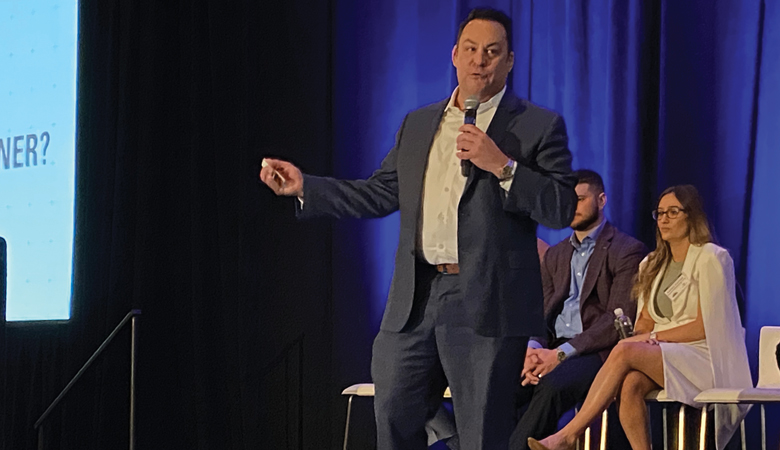
Patrick Layton discusses the company’s managed IT strategies.
During his ECS presentation, Cucco shared Impact Networking’s strategy for IT and cybersecurity success. “You have to do paid assessments. If not, A, you’re losing money, and B, the customer perceives you with no value.”
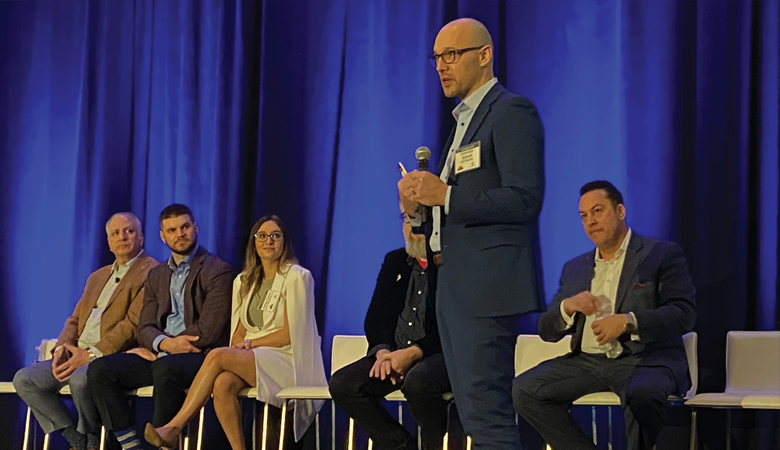
Jeremiah School provides additional insights into Impact Networking’s managed services strategies.
Impact Networking did $670,000 in monthly recurring revenue in December. Most of that was IT services, which translated to $40 million in sales. “We don’t sell anything without a five-year contract, 60-month, non-cancelable,” said Cucco.
The margins in the IT segment of the business are healthy—60% to 70%. “If you compare that to copiers, it is substantial and gives you money to reinvest in your business,” observed Cucco who also suggested that dealers “hop on cybersecurity ASAP.” He described this segment of the business as highly profitable. “Employees never leave the building. We’re not selling anything. We’re watching people’s networks. It’s all AI.”
Another area of diversification is managed digital transformation (MDX). “The great thing about a product like digital transformation is there isn’t a product,” revealed Cucco. Jon Evans, who oversees this aspect of the business, and his team essentially sells their expertise.

Jon Evans explains Impact Networking’s managed DX initiatives and what that means to customers.
“Managed IT, managed marketing, MDX, managed cyber have high value to clients,” said Cucco. “It’s not a commodity. It’s priced high. We’re really selling employees’ time and expertise, but we have to ticket [the customer]. You’re saying, ‘Okay, it’s going to take me X amount of hours.’ If I do it less than that, I’m making more money. If I go over, I’m losing money. The great thing is that there’s no warehousing of these products, no parts, no supplies, and no trucks. It’s very low overhead.”
Impact Networking’s Not-So-Secret Sauce
Hiring people who are experts in the areas Cucco wasn’t and giving them the freedom to perform was another strategy that Cucco employed to build his various managed services businesses. “That’s hard to do when you are owners and CEOs,” he said. “You want to control everything, but it’s so complicated and strategic now that you can’t know everything.”
Building a service-oriented company such as Impact Networking also means hiring the right people for the right jobs. “The concentration, for me as the CEO, is to provide future opportunities for these employees so that there’s upward mobility and they don’t want to quit,” observed Cucco.
Culture is also critical, and Cucco stressed that he wanted a culture where employees wake up in the morning, come to work happy, and are excited to go out and “kick ass.” “I think we have accomplished that,” he said.
The Future of Impact Networking
Cucco is bullish on innovation. “You have to be upfront of the wave,” he said. “If you’re behind, it’s not as profitable. If you’re going to get into something, you should get into it when it’s hot.”
Something that’s hot is AI, which Cucco described as the next big thing. “People should figure out how to monetize an AI product today because over the next few years, like cybersecurity, that’s going to be huge. You must always be evolving. You can’t just be stuck in one product. You have to see what’s coming on the market, see what’s going on, and make the right adjustments. And you have to continue to diversify the product line, and if you want to get bigger, diversify geography.”
Cucco added, “We started from nothing on a lot of different things and diversified. Anyone in this room can do this. If you have a passion for it and you hire the right people, anything can be accomplished. We’re proof of that.”
Expect to see an increased focus on e-commerce and growth in managed IT, managed cyber, and managed digital transformation at Impact Networking. However, Cucco doesn’t advocate abandoning the core imaging business. That was the dealership’s business for 18 years and what enabled it to grow to $100 million. After diversifying into IT, it grew another $5 million in five years. He emphasized that what he was sharing was a proof source.
Impact Networking has a roadmap that is shared with every employee. “Everybody should have a map of where you’re going, where you’re heading, what’s your goal,” emphasized Cucco. “Our whole company, if you ask them what we want to do, they’ll say, ‘We want to be $500 million by the end of 2027.’ If we continue to do what we did in December, we’ll actually get there. But you’ll never get there with just hardware.”
Last Words
“There’s no better time than today to be in the industry,” Cucco told the rapt ECS audience. “There hasn’t been a better time to have the products we have, the pricing we have, the margins we have. You’ve just got to take hold of it. When you see no limits, there are no limits. I live and breathe that every day. My whole life, people told me what I couldn’t do, that we couldn’t get to $30 million, we couldn’t do $100 million, whatever. I couldn’t do a million things. But when there aren’t limits in your mind, then there are no limits at all. You just have to go out and make it happen.”

